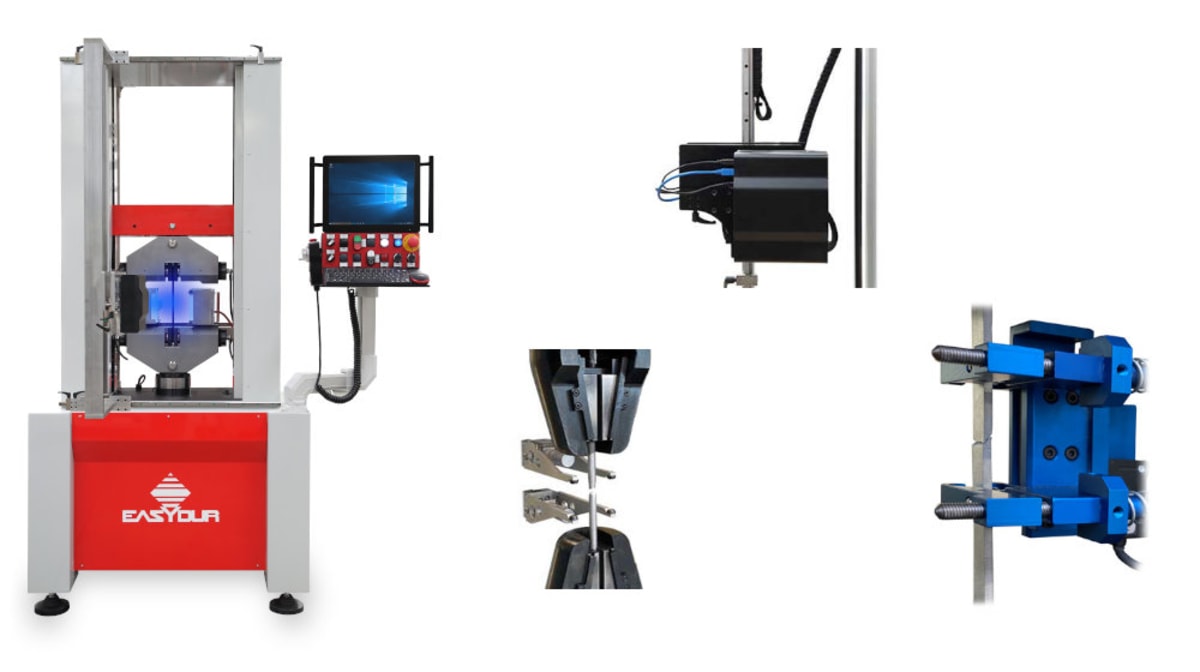Compliance with ISO 6892-1: three case studies with Easydur machines

Tensile testing of metals at ambient temperature is regulated by the UNI EN ISO 6892-1:2020 standard, which defines the criteria for measuring the mechanical properties of metallic materials. These tests help determine fundamental parameters such as yield strength, ultimate tensile strength, tensile resistance, lower yield point, elongation at break, and elongation at maximum force.
To obtain reliable and repeatable results, it is essential to use high-performance machinery that complies with the specified standards. This is where Easydur comes into play, designing and manufacturing tensile testing machines for metals, integrating the latest available technologies.
Features of Easydur tensile testing machines
Easydur tensile testing machines are distinguished by advanced engineering design, ensuring compliance with the strict tolerances set by ISO 6892-1.
Structure and main components
Easydur tensile testing machines consist of:
- test frame, available in single or double-column structures, with ball screws or satellite roller screws (for higher loads) for precise speed control;
- moving crosshead, where specimen grips, plates, and necessary accessories are mounted;
- manual, pneumatic, or hydraulic grips, selected based on the sample’s shape and size, compliant with ISO 6892-1 and ASTM E8 standards;
- high-precision load cells, Class 0.5 transducers with 200,000 operating divisions for maximum measurement accuracy;
- electromechanical drive, high-efficiency brushless motors with minimal energy consumption and maintenance requirements;
- Easydur testing software, a modular system developed for advanced test management, with data export in Excel, PDF, and TXT formats, fully compatible with Industry 4.0.
This configuration ensures repeatable and reliable results, guaranteeing full compliance with the tolerances specified in ISO 6892-1.
Accuracy and control of test parameters
To ensure that a tensile test complies with ISO 6892-1, three fundamental parameters must be controlled:
Load measurement
Easydur load cells, calibrated according to ISO 7500-1, operate in Class 0.5 and provide accuracy exceeding the minimum regulatory requirement (Class 1). The proprietary Easydur data acquisition system performs readings at 1 kHz (1,000 times per second), offering immediate feedback and real-time test curves.
Elongation measurement
Elongation can be measured using integrated absolute encoders, mechanical extensometers (manual clip-on or automatic), or video extensometers (non-contact, for maximum precision and speed).
The use of extensometers is crucial for advanced tests, such as determining elongation at yield point, as required by ISO 6892-1 Method A1 (closed-loop) or Method A2 (open-loop).
Test speed
ISO 6892-1 distinguishes between two speed control methods:
Method A (strain-based control)
Method B (stress-rate control)
Easydur machines precisely regulate speed using brushless motors and zero-clearance ball screws, ensuring the test is performed under the conditions specified by the standard.
Easydur tensile testing machine models
Depending on application requirements, Easydur offers various solutions:
| Model | Load Capacity | Type of Grips | Applications |
|---|---|---|---|
| Dyno Mono C | Up to 5 kN | Pneumatic/manual | Tests on metal wires and small specimens |
| Dyno Two Columns | 5-15 kN | Pneumatic/manual | Tests on sheets and small components |
| 3MZ | Up to 50 kN | Pneumatic/manual | Tests on bars and tubular structures |
| Aura | 100 kN - 3 MN | Hydraulic/pneumatic | Tests on fasteners, screws, bolts, and high-load materials |
You can watch examples of tensile tests on metals at both ambient and high temperatures in the video:
Three success stories with Easydur machines
Below are three case studies where Easydur designed and built machines to perform different types of tests on metal fittings, alloys, and fasteners.
1. Tensile testing on industrial fittings
An Italian company in the oil & gas sector needed to test metal fittings with loads up to 50 kN and accurately measure specimen elongation.
Easydur Solution:
3MZ machine with a 50 kN load cell
Clip-on extensometer with 1 µm precision
EasyQs software for advanced test management
Result: the system ensured reliable measurements compliant with ISO 6892-1.
2. Alloy testing in foundry applications
A specialized foundry developing new alloys needed to test material strength by varying chemical compositions and melting temperatures.
Easydur Solution:
100 kN machine with horizontal hydraulic grips
Video extensometer for non-contact measurements
Software with advanced curve analysis
Thanks to this setup, the customer optimized research and development of new metal alloys.
3. Tensile testing on large fasteners and screws
A manufacturer of fastening systems required a machine to test screws and bolts with loads up to 1 MN (100 tons).
Easydur Solution:
1 MN machine with interchangeable pneumatic grips
Dual load cell (100 tons and 30 tons)
Quick-change system to accommodate different specimen formats
This solution enabled the customer to test both finished screws and raw materials using a single machine, reducing costs and setup time.
With a wide range of models, advanced software, and dedicated accessories, Easydur remains a reference point in the metal materials testing sector. For more information on possible configurations, visit the company’s online stand at Expometals.net and use the provided contact details to reach the team.


